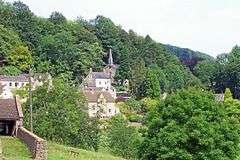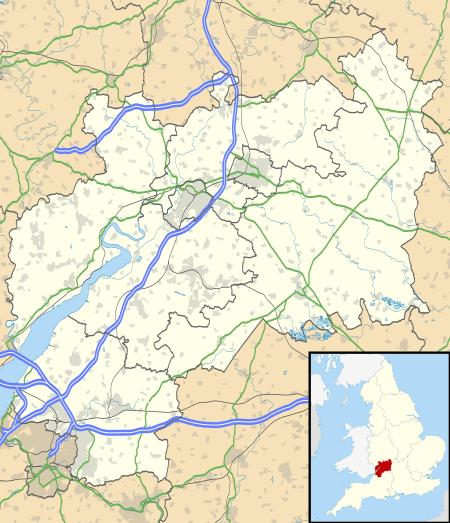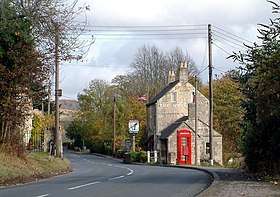Slad
Slad is a village in Gloucestershire, England, in the Slad Valley about 2 miles (3 km) from Stroud on the B4070 road from Stroud to Birdlip.
| Slad | |
|---|---|
 The village with Holy Trinity Church visible | |
 Slad Location within Gloucestershire | |
| Population | 388 (2011 census) |
| OS grid reference | SO873076 |
| Civil parish | |
| District |
|
| Shire county | |
| Region | |
| Country | England |
| Sovereign state | United Kingdom |
| Police | Gloucestershire |
| Fire | Gloucestershire |
| Ambulance | South Western |
| UK Parliament | |

Slad is notable for being the home and final resting place of Laurie Lee, whose novel Cider with Rosie (1959) is a description of growing up in the village from his arrival at the age of three in 1917.
Locale
The Slad Brook runs along the bottom of the valley. The small parish church, Holy Trinity Church, is a Grade II listed building[1] and there is also a small traditional pub, The Woolpack.[2]
Governance
Slad is in the civil parish of Painswick, in Stroud District, in the county of Gloucestershire[3] and the parliamentary constituency of Stroud.[3]
Notable people
Slad is both the home and the final resting place of Laurie Lee, whose novel Cider with Rosie (1959) is a description of growing up in the village from his arrival at the age of three in 1917. Having bought a cottage there with the proceeds from the book, he returned to live permanently in the village during the 1960s after being away for some thirty years.
Between 1970 and 1980 the poets Frances and Michael Horovitz lived at "Mullions", the end cottage of the settlement of Piedmont in an offshoot of the valley only accessible by foot from Slad. Frances' poetry from that period often refers to the surroundings there, as does Michael's Midsummer Morning Jog Log (1986).[4] Horovitz's continued occasional residence is testified not simply by that poem but by his use of the cottage as the editorial address of his magazine New Departures into the 1990s.[5]
Polly Higgins, FRSGS was a Scottish barrister, author, and environmental lobbyist, described by Jonathan Watts in her obituary in The Guardian as, "one of the most inspiring figures in the green movement".[6] She left her career as a lawyer to focus on environmental advocacy, and unsuccessfully lobbied the United Nations Law Commission to recognise ecocide as an international crime. She died on 21 April 2019, at the age of 50[6] and is buried in Slad.[7]
References
- Historic England. "Church of Holy Trinity (Grade II) (1091579)". National Heritage List for England. Retrieved 18 September 2017.
- "Home page". The Woolpack, Slad. Retrieved 19 September 2017.
- "Election Maps". Ordnance Survey. Retrieved 12 August 2013.
- Horovitz, Michael; Blake, Peter (14 April 1986). Midsummer Morning Jog Log. Five Seasons Press. Retrieved 19 September 2017.
- Horovitz, Michael (19 May 1995). "Fiddling". The Times Literary Supplement (letter). Retrieved 19 September 2017.
- Jonathan Watts (22 April 2019). "Polly Higgins, lawyer who fought for recognition of 'ecocide', dies aged 50". The Guardian.
- Matty Airey (22 April 2019). "'We must build on her legacy' – MP's tribute to Polly Higgins". Stroud News & Journal. Retrieved 24 April 2019.
External links

- Photographs of Slad and surrounding area on Geograph
- Audio history of the area (Slad filter)